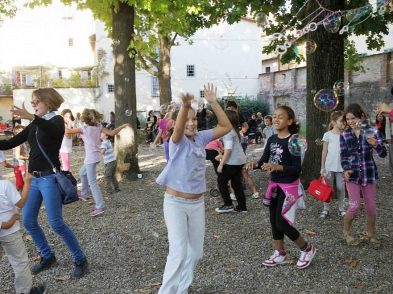This morning, a newspaper whose name means ‘read’ printed a headline that I’ve been trying to get my head around. One Italian in 10, it says, suffers from stress da rientro, a form of the blues that stems from one’s disgruntled return to work and sudden withdrawal from sea and sand.
That the syndrome exists is virtually unarguable; it’s the ‘1 in 10′ that leaves me wondering. Whoever doctored that statistic has yet return to his office. A casa mia, a ratio like this one inspires another three days of dawdling at the very least. And if anyone in ufficio gets wind of the trend, they’re certain to pull out all the stops to show that they’re the fateful ‘one’ who’s suffering from a flaming case of post-vacation doldrums.
Not me. I find September a happy month, when waiting stops and hopefulness happens. Granted, you have to be one of those school-loving folk to feel it. People who have spent the majority of their lives buzzing around a classroom like a bee to the hive wait for September as if it were Christmas. After all, there’s no better gift in this world than a new notebook with nothing in it but the smell of fresh paper. ‘Tis the season to be nuovo-new coats, new boots, new cancelleria. And the fact that Italians call office supplies a name that recalls ‘cancel’ makes me happier still. Autumn cancels out ancient debts or pushes you to zero them. Old things finally lose their clinging grasp and fall away as leaves do, having become too brown for branches.
Come September in Italy, all things forced underwater in summer come floating to the surface like cooked gnocchi, rising at the boil. Faulty plumbing takes its final stand: not another drop will go down the drain until the plumber comes. Students still in danger of ‘losing their year’ file into testing rooms after cramming three-months of remedial study into three whole nights of full-fledged worry. Deadlines, dangling projects and upcoming payments all take the front seat. Whoever’s in for the ride had better buckle up, for procrastination has reached its day of reckoning.
My colleague Francesco summed it up in two sentences when I pressed him to produce something he’d been promising for months: ‘Con l’estate,’ he said, ‘ho lasciato perdere tante cose. Ora devi darmi un minuto, e farmi fare mente locale. With the summer, I let a lot of things be lost. Now, you have to give me a minute and let me make a local mind.’
Though predictable, his statement made me smile and seriamente, how can one resist writing about it? The lasciare perdere idea takes first place. Some might call it an attitude; others may see it as an admission of weakness; still others will perceive it as a fine-tuned skill. Whatever the case, I wish I knew how to do it.
Alas, the ability to lasciar perdere is something that Italy is slow to teach. For while the expression is everywhere, it’s not a lesson for the novice traveler, and to this day I’m still unclear as to its real meaning. Does ‘let it be lost’ refer to a battle and the inclination to retreat before too much blood is unnecessarily shed? Or is it simply the more domestic habit of not minding if something get buried deep down in the pile. Secretly, I hope it’s the latter. Misplacement is far easier than being smart enough to avoid leaving your guts on the field. For the New World mind, sacrificing the conviction that struggle someday will morph into real change is like being asked to give up your first-born figlio. Lose without a fight? Lose voluntarily? Let something be lost? In Italy, this is self-preservation, and why, oh why, won’t anyone take the time to teach me how?
‘Non sono brava a lasciar perdere le cose,’ I mused.
‘Infatti, you’re very bad at it,’ Francesco nodded.
‘Did you know that in English, there’s no such thing as ‘making local mind.’
He looked at me, and I knew he agreed: linguistically, there seemed to be two strikes against me. ‘Fare mente locale è indispensabile,’ he explained. ‘It’s impossible to face the music until you’ve remembered who and what you belong to.’
‘That’s what mente locale is?’ I asked, surprised.
‘Yes, it’s about re-ordering the brain, focusing on whatever’s nearest. In English, what do you say before solving things?’
‘Nothing. We just solve them without talking about it.’ Only after the statement was out of my mouth, did I realize that I was asking for trouble.
Francesco shook his head. ‘Lascia perdere, Linda. That’s just what you think…and this is why Americans show themselves saving the world at the end of every movie. In Italian films, we never save anyone, not even our own. We all get shot while running in the street.’
Too true. Perhaps, this is why retreat is considered the smartest thing.
He reached out and touched the top of my head as I thought about his statement. And the slightly resigned grin he gave me had its own strange brand of lightness. ‘I promise, I’ll finish the project for you by next week,’ he said.
‘Grazie,’ I smiled. It wasn’t true, of course. But he didn’t yet know that he was lying. Still, I decided to lasciar perdere and take his promise for good. It’s September and you have to start somewhere.








